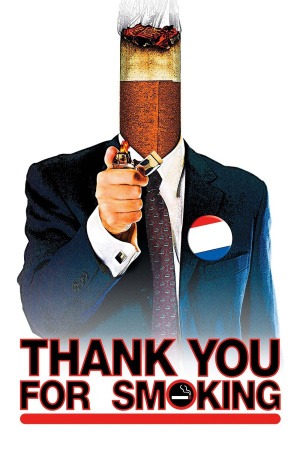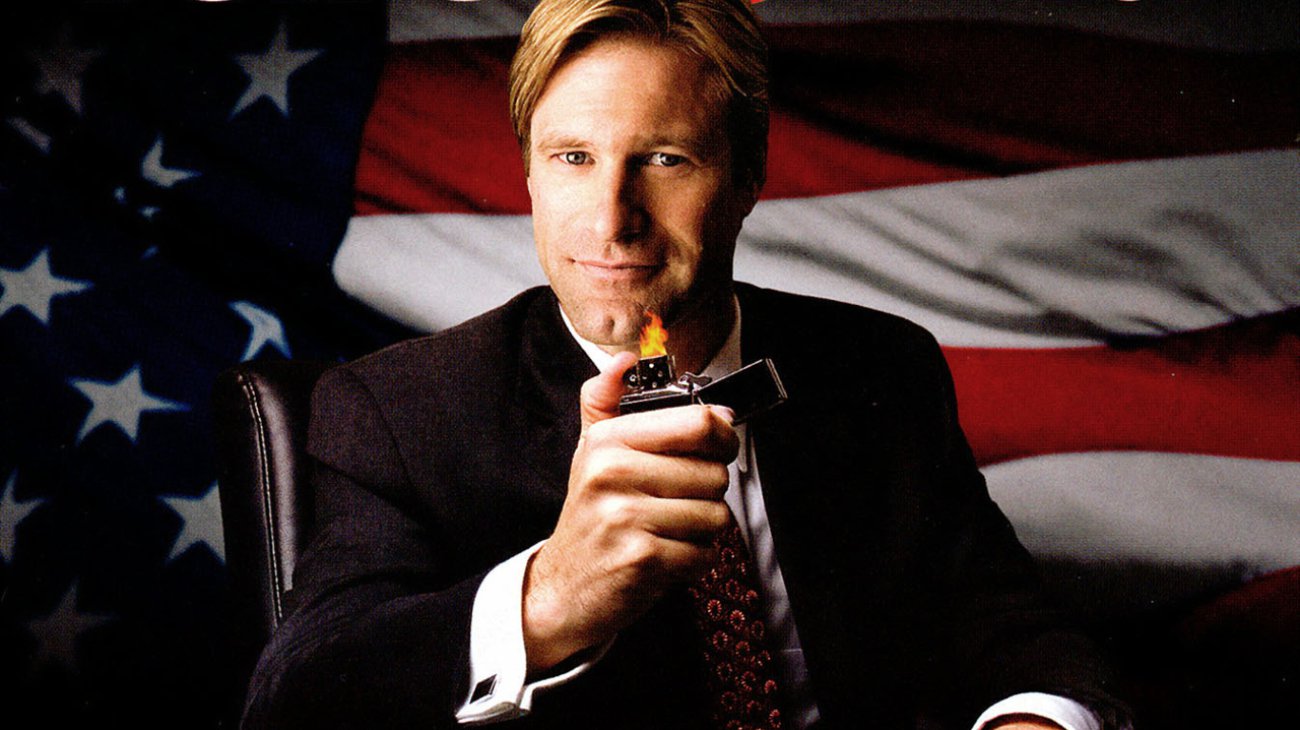
Glibertarians
I'm not sure exactly how to talk about Thank You for Smoking, a film specifically and unavoidably about politics that is politically infantile. Yet it seems harsh to take it to task for that, given the degree to which politics are given short shrift in favor of genial comedy.
It's about Nick Naylor (Aaron Eckhart), a tobacco lobbyist. I'm not sure what else to say about the plot, because there really isn't one; it's mostly just a series of vignettes showing what he does in love, and how he does it. The original book, by William F. Buckley's son Christopher is unread by me, but I imagine a man with that sort of Washington inside is probably mostly right in his depiction of the lobbying life.
Vignettes include: bedding a reporter (Katie Holmes) mostly to prove he can; taking his son (Cameron Bright) to California for an interview with a movie exec (Rob Lowe); a visit to The Captain (Robert Duvall), the oldest and most revered of all tobacco executives; a showdown with a senator (William H. Macy) on an anti-smoking crusade).
I need to get this out of the way: despite his daddy's solid conservative persona, Christopher Buckley is, to judge from this story, libertarian. And despite his daddy's solid liberal persona, writer/director Jason "Son of Ivan" Reitman is, too. Now, I have libertarian friends, but that doesn't mean that I don't find libertarianism to be just about the most inconceivable of all American political positions (that's right, I think neoconservativism makes more sense, on its face, than libertarianism). The movie is a perfect example of why: it is a film whose ultimate theme is best expressed as, "the American people deserve to be allowed to choose what's right for them" (which I guess is a hard statement to disagree with), but this theme is peppered in a story about a man whose entire existence is predicated on the truth that the American people are really fucking stupid. Or at least, that it's really easy to make us believe lies. I wouldn't harsh on a film just for being libertarian (I love South Park), but when a movie refutes itself, that's a problem.
I promise I won't keep railing on politics, because I've already given more thought to it in this review than the film does.
The film's success, which is considerable, is due entirely to its cast. Okay, that's not fair, there's a lot of fun to be had in the screenplay. But almost all of the performances are perfect beyond the written word, and Aaron Eckhart is chief among them all. It's not his best work (see: In the Company of Men), but it's a perfect character for his style: an smug asshole who knows that being a smug asshole is the very core of his appeal. Rob Lowe and Adam Brody (as his assistant, with the very best lines in the film), nail the distracted airy shallowness that means "movie exec" in the movies; et cetera et al ad infinitum. Only Holmes (who needs to be so hot that no man can resist her even at the risk of ruining his life) fails to fully sell her role; and then there's Cameron Bright, who is the least charismatic child actor in the history of cinema. By the end I couldn't even look at the screen when he was on.
This is nobody's idea of great satire - it's far too simple and broad. Example: the movie agency Naylor visits has the initials E-G-O; har har, movie execs work for ego! Or the clumsy way that Macy is made a strawliberal (he wears socks and Birkenstocks! har!) and Duvall is made a good ol' boy conservative (he actually chomps on a cigar, the only character in the film to use tobacco; when you're stealing iconography from the Bolshevik revolutionary cinema, you need to freshen your playbook). But if you can turn off your brain for a little bit, and let the dialogue wash over you. It's satire for people who know nothing about business or politics, but it's good simple fun.
Unfortunately, Reitman isn't a very delicate filmmaker. It's his debut, so I can forgive a little bit, but there's a continuous tendency to oversell jokes that don't need it, mostly through the use of cloyingly playful editing. I grew tired of cutting from a punchline to a visualization of that punchline, and I started out tired of the use of subtitles and cute little floating images.
The film is also ugly. It looks all brown and nasty, sort of like a 70s movie (why yes, there were gorgeous films in the early 70s, just not many). There seems to be no reason for this to have been a choice, and it made the film mildly unpleasant to look at. Basically, it looked like a film made for its budget, which I shouldn't grouse about. But I've seen a lot of cheap horror films recently, and whatever their other sins, they usually look great.
What I keep returning to is the film's unclear moral tone. It clearly doesn't want to lionize Naylor, but it's in no hurry to demonize him, either. Satire should go for the jugular, and this doesn't really. It's just poking fun at easy targets. But I laughed. I won't lie. I laughed a lot, in fact.
7/10
It's about Nick Naylor (Aaron Eckhart), a tobacco lobbyist. I'm not sure what else to say about the plot, because there really isn't one; it's mostly just a series of vignettes showing what he does in love, and how he does it. The original book, by William F. Buckley's son Christopher is unread by me, but I imagine a man with that sort of Washington inside is probably mostly right in his depiction of the lobbying life.
Vignettes include: bedding a reporter (Katie Holmes) mostly to prove he can; taking his son (Cameron Bright) to California for an interview with a movie exec (Rob Lowe); a visit to The Captain (Robert Duvall), the oldest and most revered of all tobacco executives; a showdown with a senator (William H. Macy) on an anti-smoking crusade).
I need to get this out of the way: despite his daddy's solid conservative persona, Christopher Buckley is, to judge from this story, libertarian. And despite his daddy's solid liberal persona, writer/director Jason "Son of Ivan" Reitman is, too. Now, I have libertarian friends, but that doesn't mean that I don't find libertarianism to be just about the most inconceivable of all American political positions (that's right, I think neoconservativism makes more sense, on its face, than libertarianism). The movie is a perfect example of why: it is a film whose ultimate theme is best expressed as, "the American people deserve to be allowed to choose what's right for them" (which I guess is a hard statement to disagree with), but this theme is peppered in a story about a man whose entire existence is predicated on the truth that the American people are really fucking stupid. Or at least, that it's really easy to make us believe lies. I wouldn't harsh on a film just for being libertarian (I love South Park), but when a movie refutes itself, that's a problem.
I promise I won't keep railing on politics, because I've already given more thought to it in this review than the film does.
The film's success, which is considerable, is due entirely to its cast. Okay, that's not fair, there's a lot of fun to be had in the screenplay. But almost all of the performances are perfect beyond the written word, and Aaron Eckhart is chief among them all. It's not his best work (see: In the Company of Men), but it's a perfect character for his style: an smug asshole who knows that being a smug asshole is the very core of his appeal. Rob Lowe and Adam Brody (as his assistant, with the very best lines in the film), nail the distracted airy shallowness that means "movie exec" in the movies; et cetera et al ad infinitum. Only Holmes (who needs to be so hot that no man can resist her even at the risk of ruining his life) fails to fully sell her role; and then there's Cameron Bright, who is the least charismatic child actor in the history of cinema. By the end I couldn't even look at the screen when he was on.
This is nobody's idea of great satire - it's far too simple and broad. Example: the movie agency Naylor visits has the initials E-G-O; har har, movie execs work for ego! Or the clumsy way that Macy is made a strawliberal (he wears socks and Birkenstocks! har!) and Duvall is made a good ol' boy conservative (he actually chomps on a cigar, the only character in the film to use tobacco; when you're stealing iconography from the Bolshevik revolutionary cinema, you need to freshen your playbook). But if you can turn off your brain for a little bit, and let the dialogue wash over you. It's satire for people who know nothing about business or politics, but it's good simple fun.
Unfortunately, Reitman isn't a very delicate filmmaker. It's his debut, so I can forgive a little bit, but there's a continuous tendency to oversell jokes that don't need it, mostly through the use of cloyingly playful editing. I grew tired of cutting from a punchline to a visualization of that punchline, and I started out tired of the use of subtitles and cute little floating images.
The film is also ugly. It looks all brown and nasty, sort of like a 70s movie (why yes, there were gorgeous films in the early 70s, just not many). There seems to be no reason for this to have been a choice, and it made the film mildly unpleasant to look at. Basically, it looked like a film made for its budget, which I shouldn't grouse about. But I've seen a lot of cheap horror films recently, and whatever their other sins, they usually look great.
What I keep returning to is the film's unclear moral tone. It clearly doesn't want to lionize Naylor, but it's in no hurry to demonize him, either. Satire should go for the jugular, and this doesn't really. It's just poking fun at easy targets. But I laughed. I won't lie. I laughed a lot, in fact.
7/10
Categories: comedies, political movies, satire






